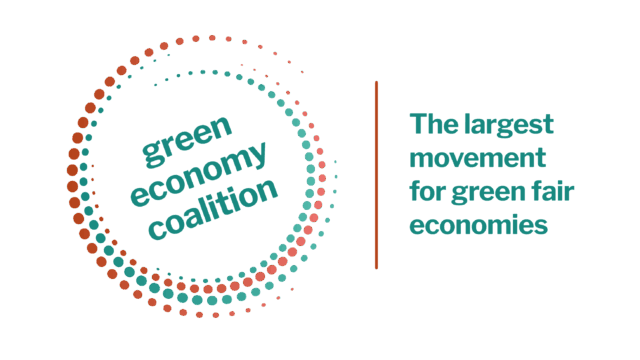New eco-social contracts for the UN's 'Pact for the Future'
Our submission to the UN Summit for the Future explores how eco-social contracts can help reshape the Sustainable Development Goals

New eco-social contracts that incorporate ecological, social and economic elements are a vital prerequisite for a successful Pact for the Future that would bring fresh momentum to the 2030 Agenda.
This is the belief of the Global Research and Action Network for a New Eco-Social Contract (GRAN-ESC) - convened by UNRISD and the Green Economy Coalition - which brings together 350+ organisations and individuals in 73 countries from the research, practice, advocacy and policy decision-making communities working for social, climate and environmental justice in a progressive knowledge and action alliance.
The network is excited to engage with Our Common Agenda and towards the 2025 Social Summit. To be effective, GRAN-ESC argues that the Pact must:
identify actions, institutions and processes available to stakeholders at multiple levels to define new eco-social contracts; and
integrate respect for human rights and social, economic, climate, gender and environmental justice across the Pact, thus ensuring social inclusion, intersectionality, decent work and valorisation of the care economy, intergenerational justice, the rights of nature and a contract for nature, and biological and cultural diversity.
We recommend that the Pact:
Chapeau
Continues and strengthens its commitment to a renewed social contract, centred in human rights and delivery of the 2030 Agenda and incorporating a contract for nature, hence an “eco-social contract”;
Centres these new eco-social contracts on seven principles, as set out in UNRISD (2022): human rights for all; progressive fiscal contracts; transformed economies and societies, a contract for nature, addressing historical injustices, gender justice, and solidarity;
Recognises that addressing current and future challenges entails broadening our understanding of “social contract” to include the rights of nature, biodiversity, and sustainable development;
Explores concrete, deliberative processes that can create ‘eco-social contracts’ at national and community level; and sustain them afterwards through ‘pilot’ projects that help move words to action;
Recognises that radical, transformative responses are warranted to ensure a just transition to a sustainable and inclusive future.
- Addresses omissions from the existing Our Common Agenda commitments, specifically:
the creation of just transition processes and new deliberative models at local, national and regional levels;
fair fiscal contracts and phasing out fossil fuel subsidies,
deeper recognition and enumeration of both human rights and the rights of nature; and
organised and transparent representation of individuals and communities subjected to social, political and economic exclusions, women, people living with disabilities, indigenous peoples and other oppressed groups.
Chapter 1 - Sustainable development and financing for development
GRAN-ESC recommends that the Pact:
Considers the “Green Economy dialogues” approach to community-led sustainable development policymaking, ensuring broad-based popular support for ambitious and transformative approaches, as well as accelerating and then securing gains over the medium term and broadens this into a comprehensive eco-social contract approach;
Address the need for a comprehensive roadmap of what a structural eco-social transition should look like, which policy measures are the most important, and the investment cases for different approaches;
Push back against national approaches to green transition that remain uncoordinated and perhaps even mutually incompatible, engendering competition rather than cooperation towards green goals and threatening to undermine the speed and effectiveness of the green transition;
Emphasise that national measures alone will be insufficient to address the scale of the challenge, and risk leaving emerging economies in the majority world behind;
Create a UN-backed multilateral framework to create coherence and cooperation, driving long-term investment towards specific structural policy changes which remain acutely under-resourced and that can only be achieved at a multilateral level;
Seek to incentivise governments, investors, banks, creditors and other financial actors to co-develop pathways towards green structural policy financing – especially for debtor nations of the Majority World;
Create a UN taskforce on structural green and eco-social transition policies that can build coherence and consensus beyond fragmented national-level green stimulus and recovery packages;
Urgently advocate for substantial efforts to fund the fair elimination of fossil fuel subsidies, and their replacement by comprehensive alternative forms of social protection, access to affordable clean energy sources, and full integration of broad-based means of state support to low-income and marginalised groups;
Support the reliable and adequate funding of global funds for the SDGs, climate mitigation and adaptation, loss and damage, universal social protection, and employment creation;
Create fair fiscal contracts at national and global levels, through promoting progressive tax systems, combatting IFF and tax evasion, and reforming the international financial architecture by strengthening the role of the UN in tax matters, solving the global debt crisis, and mobilising financial resources to support just transitions in the Majority World.
Chapter 4 - Youth & Future generations
GRAN-ESC recommends that the Pact:
Fully recognise the vital importance of giving marginalised groups more of a say in shaping both present policy-making and the future outcomes of those policies, specifically with focus on children, and an intersectional focus on young people, those yet to be born, people living with disabilities, and indigenous groups;
Seek to create participatory and deliberative spaces and processes that will allow for the above-mentioned marginalised groups to provide genuine insights and participation, rather than the mere co-option of their views;
Ensure that the “Just” part of “Just Transition” attends to both justice today, within communities that are transitioning, and in the future, considering rights & needs of children, young people, and generations yet to be born - including future humans many generations hence.
Chapter 5 - Transforming Global Governance
GRAN-ESC recommends that the Pact:
Incentivise and encourage the adoption of policies for structural sustainability at the level of institutions, legal frameworks, and international architecture;
Address financing risks for the green and eco-social transition, with a particular focus on removing barriers to transition faced by highly-indebted and debt-distressed nations and the Majority World;
Push back on policy incoherence arising from national green transition plans that are designed and implemented with little thought towards global co-benefits;
Empower a greater role for labour groups and the voices of labour to shape governance and policy, as part of greater democratisation of shared multi-stakeholder multilateral institutions and the full implementation of human rights and ILO conventions;
Support and encourage reform of existing international financial architecture, to provide greater buy-in and legitimacy of international financial institutions in the Majority World, and remove blockages to investment in delivery of SDGs, as part of refreshing and creating new multilateral eco-social contracts;
Introduce mechanisms to regulate global value chains so as to ensure the respect of human rights, labour standards, gender justice in all its diversity, and climate and environmental commitments (such as the Paris Agreement, the biodiversity compact etc);
Building on the UN Guiding Principles on Business and Human Rights, support binding national, regional and multilateral due diligence legislation/treaties on business and human rights;
Recognise and affirm efforts towards the legal recognition and protection of the rights of nature, sentient beings, and non-human animals;
Recognise the existing and potential role played by many groups of Indigenous Peoples in upholding and enforcing the rights of nature, and empower said groups as per the Declaration on the Rights of Indigenous Peoples;
Push for the strengthening of existing democratic institutions, and encourage the creation of new deliberative processes at local, regional, national and global levels in order to address democratic deficits, deliver broad-based public support, ensure transparency and legitimacy of outcomes, accelerate ambitious policy-making, overcome polarisation and tackle populism;
Recognise that the above deliberative processes may include (but are not limited to) citizen’s assemblies, just transition approaches to economic and social change, participatory budgeting, and citizen dialogues;
Recognise that new and emerging “eco-social contract” approaches provide an invaluable toolbox of different policy-making possibilities, eg: green deals, social guarantees, new economic thinking (post-growth, social and solidarity economy, wellbeing, circular), ubuntu, buen vivir, structural transformation, and others.


